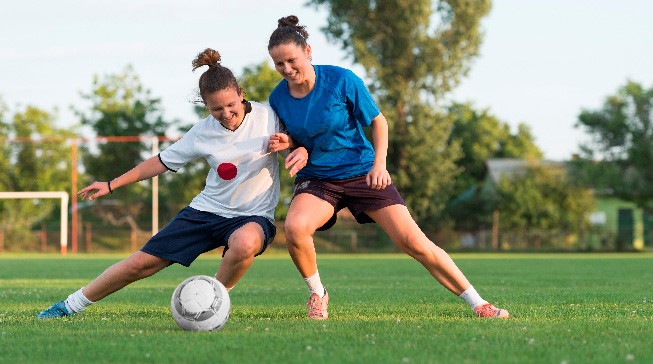Sports Competition Preparation: Get Ready to Win
Prepare for success in sports competitions with expert tips. Explore the process of sports competition preparation to achieve victory.

Competing in a sports event or competition is not merely about showing up on the day and giving it your best shot. It's a meticulous process that involves months, sometimes even years, of preparation, dedication, and discipline. Athletes, whether professional or amateur, go through a well-defined sequence of steps to ensure they are in peak condition physically, mentally, and emotionally. This process is crucial for achieving their personal best and, in some cases, clinching victory. In this comprehensive guide, we will describe the intricate process of gearing up for a sports competition or event, from the initial motivation to the final moments before the competition begins.
Setting the Goal
Everything starts with a goal. Athletes need a clear objective in mind, whether it's winning a championship, setting a personal record, or simply participating to challenge themselves. This goal serves as the driving force throughout the entire preparation process. It's what keeps athletes focused and committed to the rigorous training and lifestyle adjustments that lie ahead.
Developing a Training Plan
Once the goal is established, the next step is to create a detailed training plan. This plan typically involves working with coaches, trainers, and sometimes even sports scientists to design a program tailored to the athlete's specific needs and objectives. The plan outlines the daily, weekly, and monthly training routines, including the types of exercises, duration, intensity, and recovery periods.
Nutrition and Diet
Nutrition plays a pivotal role in an athlete's performance. A balanced diet ensures that the body receives the necessary nutrients to support muscle growth, repair, and overall health. Athletes often work with nutritionists to create meal plans that align with their training requirements. They may also adjust their calorie intake to gain or lose weight as needed to optimize their performance in a particular sport.
Conditioning and Strength Training
Conditioning and strength training are crucial components of an athlete's regimen. These exercises help build endurance, agility, speed, and power. Depending on the sport, athletes may focus on weightlifting, plyometrics, cardio, or a combination of these activities. The training program evolves over time to continually challenge the athlete's body and prevent plateaus in performance.
Sport-Specific Skills Training
In addition to general conditioning, athletes must hone their sport-specific skills. This could involve perfecting a golf swing, improving tennis serves, practicing free throws in basketball, or refining any other skills relevant to their sport. Repetition and refinement are the keys to mastery.
Mental Preparation
The mental aspect of sports preparation is often overlooked but is just as critical as physical training. Athletes must develop mental toughness, focus, and resilience to handle the pressure of competition. Techniques such as visualization, meditation, and working with sports psychologists can help athletes strengthen their mental game.
Injury Prevention and Rehabilitation
Injuries are a common setback in sports. Athletes must take precautions to prevent injuries through proper warm-ups, stretching, and technique refinement. However, injuries can still occur, and having a rehabilitation plan in place is essential to ensure a speedy and effective recovery.
Monitoring Progress
Throughout the preparation process, athletes and their support teams closely monitor progress. This may involve regular assessments of physical fitness, skill development, and mental readiness. Adjustments to the training plan are made based on these assessments to ensure that the athlete is on track to meet their goals.
Competition Simulation
As the competition date approaches, athletes engage in simulation exercises to replicate the conditions they will face during the actual event. This could include mock competitions, practice runs, and timed trials. Simulations help athletes build confidence and adapt to the competitive environment.
Tapering
In the final weeks leading up to the event, athletes go through a tapering phase. This involves reducing the volume and intensity of training to allow the body to recover and peak on the day of the competition. It's a delicate balance between maintaining fitness and avoiding burnout.
Fine-Tuning and Strategy
During the tapering phase, athletes also fine-tune their strategies and game plans. They analyze their opponents, review past performances, and work with coaches to develop a winning strategy. This strategic preparation is just as important as physical and mental readiness.
Logistics and Travel
For events that require travel, athletes need to plan their logistics meticulously. This includes booking accommodations, transportation, and ensuring they have all the necessary equipment and supplies. Travel can be physically and mentally draining, so proper planning is essential.
Pre-Competition Routine
In the hours leading up to the event, athletes have a pre-competition routine. This routine often includes warm-up exercises, mental preparation, and rituals that help them get into the right mindset. Some athletes have lucky charms or superstitions they follow to boost their confidence.
Nutrition on Competition Day
On the day of the event, athletes pay close attention to their nutrition. They consume carefully planned meals and snacks to provide the energy needed for peak performance. Proper hydration is also critical to prevent dehydration during competition.
Visualization
Visualization is a powerful tool used by many athletes. Before competing, they mentally rehearse their performance, visualizing every move and every detail of the competition. This helps build confidence and reinforces their game plan.
Handling Pressure
Dealing with pressure is a significant part of gearing up for competition. Athletes must learn to manage nerves and anxiety, which can affect their performance. Breathing exercises, relaxation techniques, and positive self-talk can help keep pressure in check.
Support System
Behind every athlete, there's a support system that includes coaches, trainers, family, friends, and sometimes sports psychologists. These individuals provide emotional support, guidance, and motivation throughout the preparation process.
Pre-Event Checklists
Athletes often have pre-event checklists to ensure they have everything they need on competition day. This includes equipment, clothing, nutrition, hydration, and any necessary documentation or credentials.
Arrival at the Venue
Arriving at the competition venue is a moment of anticipation. Athletes soak in the atmosphere, familiarize themselves with the surroundings, and get a sense of the competition environment. This helps them feel more comfortable on the big day.
Final Warm-Up
Before the competition begins, athletes engage in a final warm-up session. This includes physical warm-up exercises and mental preparation to ensure they are in the best possible condition when they step onto the field, court, or track.
The Competition
Finally, the moment of truth arrives?the competition itself. Athletes execute their training and strategies to the best of their ability. Whether it's a sprint, a marathon, a tennis match, or a gymnastics routine, they give it their all.
Post-Competition Recovery
After the competition, recovery is crucial. Athletes engage in cool-down exercises, stretching, and sometimes even massages or ice baths to aid in the recovery process. They also reflect on their performance, identifying areas for improvement.
Analysis and Review
Once the dust settles, athletes review their performance with their coaches and support team. This analysis helps them understand what went well and where they need to improve. It forms the basis for future training and preparation.
Rest and Regeneration
After intense competition, athletes take a well-deserved break. Rest and regeneration are essential for physical and mental recovery. It's a time to relax, spend time with loved ones, and recharge for the next phase of training.
Goal Setting for the Future
The conclusion of one competition often marks the beginning of preparations for the next one. Athletes revisit their goals, set new targets, and continue the cycle of training and improvement.
Learning from Setbacks
Not every competition ends in victory. Athletes must learn to cope with setbacks and defeats. These experiences can be valuable in shaping their character and motivation to push even harder in the future.
Celebrating Achievements
It's also important to celebrate achievements, whether big or small. Acknowledging progress and success along the way provides motivation and a sense of accomplishment.
Long-Term Health and Well-Being
Beyond individual competitions, athletes also focus on their long-term health and well-being. This includes injury prevention, maintaining physical fitness, and transitioning to life after competitive sports.
Mentoring and Coaching
Experienced athletes often take on mentoring and coaching roles to pass on their knowledge and expertise to the next generation. This helps cultivate talent and ensures the sport continues to evolve.
Support from the Community
Lastly, athletes often receive support and admiration from their local communities and fans. This support serves as a source of inspiration and motivation, reminding them of the impact their achievements have on others.
gearing up for a sports competition or event is a comprehensive and intricate process that goes far beyond physical training. It encompasses mental preparation, nutrition, logistics, and a strong support system. Athletes dedicate themselves to months or even years of preparation to achieve their goals and compete at their best. The journey is filled with challenges, setbacks, and victories, all of which contribute to the athlete's growth and development. Regardless of the outcome, the process itself is a testament to the power of dedication, discipline, and the pursuit of excellence in the world of sports.
What's Your Reaction?

















